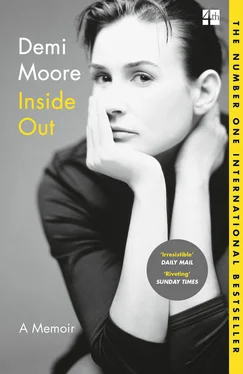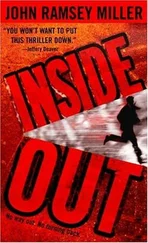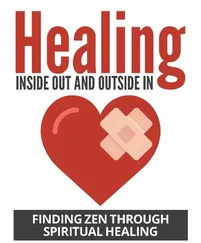I’m not saying I was the perfect sister: my nickname for Morgan was, after all, “Butthole.” (One of my favorite forms of torture was to pin him down, fart into my hand, and hold it over his nose.) But I had a clear sense from early on that I had to look out for him—for both of us, really, because ours were not exactly helicopter parents. Once, when Morgan was three or four, he was standing on the back of the couch, looking out the window, and jumping, and I remember saying to my mother, “He’s going to fall and hurt himself!” He did, of course, and I tried to catch him, but I was too small. I broke his fall, but I couldn’t stop him from cracking his head open on the coffee table. It was like a scene out of a movie: my mom jumping up and yelling, “Don’t move!,” and wrapping his bleeding head in a towel before we rushed him to the hospital. He had fractured his skull, and for a long time after they stitched him up he looked like Frankenstein’s monster.
Soon after he was born we left Roswell for California, the first of a series of moves that would define our childhood. My mother figured out that my dad was having an affair, so she did what she’d been taught to do by her mother when your husband is fooling around: she got him away from “the problem.” It did not seem to occur to the women in my family that if you took your cheating husband along when you left, the problem came with you wherever you went.
For most people, the idea of moving is a big deal. All that change; having to find a new place to live; the hassle and stress of setting up life and finding a new doctor and dry cleaner and grocery store—not to mention getting your kids settled in new schools and figuring out the school bus route and so on. It would require a lot of thought and preparation and planning.
That’s not how it was for us. My brother and I have calculated that throughout our childhoods, we attended at least two new schools a year, and it was often more than that. I didn’t realize until much later that this wasn’t how everybody lived. When I hear about people who’ve had the same friends since kindergarten, I can’t imagine what that must be like.
Moving wasn’t dolled up for us kids. There would be a mounting sense that something was going on, a plan was being hatched, and the next thing I knew we’d be hitting the road in one of the many earth-toned vehicles my parents had over the years: the rust-colored Maverick, the brown Pinto, the beige Ford Falcon. (They were all brand new, except for my dad’s prized ’55 baby-blue Chevy Bel Air.) It was often presented as a necessity: Dad was so good at what he did—and he was good at what he did—that they needed him at another paper in another town. Our job was to support him. In those early years, moving didn’t feel like a big deal or a hardship. It was just what we did.
I WAS HOSPITALIZED for my kidneys a second time when I was eleven, and coincidentally or not, it was right after one of my father’s affairs. Of course, at the time, I didn’t know in any literal way that my dad was cheating, yet I can’t help but wonder if my kidney flare-ups weren’t my body’s way of expressing what was going on at home. It was a Band-Aid, but for a while at least, it put the focus back on our family.
Ironically, at that point things had seemed unusually settled: we’d moved back to Roswell a few years earlier, and it had felt like coming home. We lived in a sweet three-bedroom ranch; I had my own room, with a pink canopy bed and a matching bedspread. Morgan shared his room with my dad’s little brother George. (George had been living with us since I was five—as peripatetic as my parents were, they had taken him in without hesitation when my paternal grandmother died and he had no other place to go. He was like a big brother to me.) We’d made friends with the four kids who lived across the street, and we went back and forth between the two houses seamlessly—it was the first time we’d been in one place long enough for me to make friends I can really remember.
I was walking home from school one day when I felt a strange heat spreading through my body. The skin on my belly and my cheeks was getting tighter and tighter. I rushed to the bathroom and pulled down my pants to check my “cookie,” but this time I was swelling up everywhere.
At St. Mary’s Catholic Hospital in Roswell, I was surrounded by nuns. I quickly settled into the familiar routine: they had to measure my urine output and take my blood twice a day—it was before they invented those little plastic ports so they had to stick a new needle into my veins every single time. But even with all that poking and pricking, I felt at ease, knowing I was being taken care of.
By chance, Morgan had to get an operation for a hernia at the same time, and they put us together in one room. I was the expert on hospital life, and anyway, I was his big sister: as long as we were in that room, I was in charge. (We did argue about what to watch on television, though, and this was before remote controls, so to change the channel we needed to call in a nun. Morgan didn’t care—he was six—but I was worried about losing my status as world’s best patient. When he got better, I wasn’t sad to see him go.)
When I went back to school, I still had to have my urine tested regularly, and I would get pulled out of class to go to the principal’s office so they could make sure I had my snack. I was so bloated from steroids that a classmate asked me if I was Demi’s sister. I didn’t feel special the way I had at the hospital; I felt embarrassed and different. I didn’t want people to see me like this.
And so I was almost relieved when my parents told us we were moving again. My mother, I would later discover, had found a red pubic hair in my father’s underpants when she was doing the laundry, and after my parents battled it out they came to the inevitable conclusion that there was only one thing to do: move. Farther than usual this time, to the other side of the United States: Canonsburg, Pennsylvania.
This was a big deal. My parents sat us down and told us in advance, which raised the pitch of the whole thing. And this time we got an actual U-Haul. I remember filling it up with our beds, the green couch, my mother’s ceramic partridges, and that coffee table Morgan had busted his head on. When we’d finished packing, we didn’t think there was enough room for all of us in the cab. My mother was half kidding when she suggested I sit down on the passenger’s-side floorboard, by her feet. I took her up on the offer. It was fun down there: I laid out a blanket and an airplane pillow and made my own little cave. It was a very long drive, made longer by a blizzard that was so bad my dad had to pull over because he couldn’t see the road. I was down by the heater, so it felt cozy and safe in my spot.
CANONSBURG WAS VERY different culturally from New Mexico or California. We were from a “y’all” family, and everyone in Canonsburg said “y’uns” instead. (My mom’s accent was always strong, wherever we were; Morgan does a great impression of her asking for “a big ole Coke and a b’rito”—i.e., a burrito .) It was particularly hard for my brother, who was more introverted than I was and often got bullied. I was tougher, scrappier. My coping mechanism was to go into every new situation and immediately start operating like a detective: How does it work here? What are people into? Who are my potential allies? What should I be afraid of? Who holds power? And of course, the big one: How can I fit in? I would try to crack the code, figure out what I had to do, and master it. These skills would become essential later on.
We settled into a development of townhouses in a hilly area with a pond that froze over in wintertime, which meant we could go ice-skating. Morgan learned to ride a bike. I was eleven years old and loved gymnastics. I was also just on the verge of puberty. I was desperate for breasts: every night, I lay in my bed and actually prayed for them.
Читать дальше











